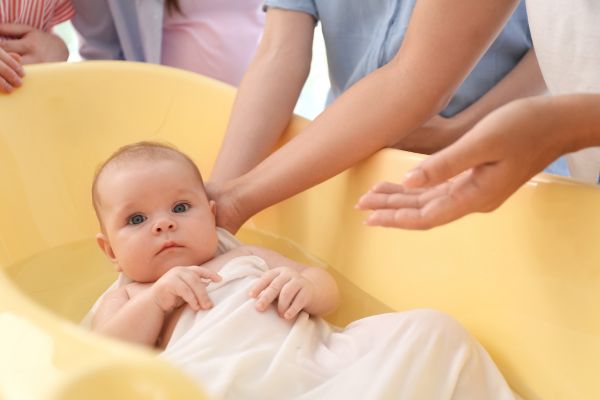Newborn Baby Care Tips
Introduction
Congratulations on your new baby! While having a Newborn Baby Care in your home is an exciting time in every parent’s life, caring for a newborn baby can be difficult.
Although caring for a newborn can seem daunting and exciting, there are basic tips that will help you to make the process easier. We’ll cover the most important things to remember for newborn babycare, including hygiene and safety.
Tips for New Born Baby Care
Here’s some advice for new moms on baby care:
- Make sure baby is dry and clean
- Bonding
- Sleep
- Feeding
- Immunisations
- Safety
Make sure baby is dry and clean
To avoid nappy rash or other skin irritations, it’s important that baby’s skin is clean and dry. To clean the baby’s bottom, use unscented baby wipes. You can also apply a barrier lotion if necessary. Many parents prefer disposable nappies or cloth diapers, but it’s important to make sure that the liner is protected from irritation.
Bonding
For their development, bonding with the baby can be crucial. To build a bond with the baby, spend time cuddling, talking, playing, and playing together every day. It is crucial to be responsive to their needs quickly, such as when they feel hungry or need a nap.
Sleeping
While newborn babies can sleep a lot, their sleep patterns can be very unpredictable. It is important to allow them to sleep when they need it and to wake them up for food every few hours. They (and their families) can get a good nights sleep by setting a bedtime routine.
Feeding
No matter whether a new mom is bottle-feeding or breastfeeding, it is vital to give your baby food on demand. In their early years, babies may want to be fed every 2 hours. As they get older, they will no longer need to eat as often and will be able sleep for longer periods at night.
Immunizations
Baby’s are very fragile and should be protected against many diseases. It is crucial to make sure that your baby is up-to date on all vaccinations. Most babies in the US have been vaccinated against hepatitis B (and other diseases), rotaviruses, diphtherias, tetanus and pertussis (whooping-cough).
Safety
Babies are curious, love to explore and enjoy exploring. But they don’t know what’s safe for them or what isn’t. You must baby-proof your home to avoid accidents. Cover electrical outlets with a cover, place gates at top and bottom of stairs, and make sure that all drawers are locked.
Nurturing Concern
It’s not the quality or quantity of nutrition that is important when it comes down to nutrition for babies. The mother’s milk provides the infant with all the nutrition during their first six months. For two years, breastfeeding can be continued for additional foods. This is the most important baby tip for new moms. But, quality of mother’s milk can be affected indirectly by her diet. A varied and healthy diet will make her feel tired and less energetic. This can lead to her feeling less inclined or even unable to breastfeed.
Infection Control
For new moms, infection control is the second most important baby care tip. Babies born after birth are more at risk for infection than adults. This is because their immune systems have not developed fully. Protecting them with vaccines against common childhood diseases like rubella, measles, mumps is the best way to do so. Parents should ensure that they thoroughly wash their hands after using and changing their nappies. Disposable nappies offer a better option, as they minimize the risk for cross-infection.
Thermal Protection
For new moms, thermal protection is the third most important baby tip. Babies can’t regulate their bodies temperature as well as adults. Therefore, it is crucial to make sure they are not too warm or too cold. The ideal temperature for a baby’s room is between 68 to 72 degrees Fahrenheit. The best clothing for babies should be light and breathable.
Get immediate care at delivery
A fourth tip is to provide immediate care during delivery. Every baby should have a complete physical examination within 24 hours after birth. You will need to check their heart rate, breathing and reflexes, measure their weight, length and head circumference and screen them for any common genetic disorders. Premature babies or those born with low birth weights should have an additional examination that includes hearing and jaundice tests.
Assessment of health problems
New moms should consider health problems assessment as their fifth baby care tip. Every newborn baby should have his or her hearing tested before they are admitted to the hospital. Also, babies born prematurely or who have a low birthweight should be tested for potentially dangerous blood disorders such sickle cell disease and cysticfibrosis. These conditions are common in babies born before full term. Also, jaundice in newborn babies should be tested. This is when the baby’s whites and skin turn yellow. While jaundice is typically harmless, it can indicate more serious medical conditions.
Recognizing and responding to danger signals
For mothers to know what danger signs babies are displaying, they should be prepared to act. You should be aware of danger signs such as fast breathing, blue fingers or lips and difficulty waking up. If parents see any of these symptoms, they should immediately contact the doctor.
Read Also:
https://www.babydr.co.uk/explode-doctor-visits/
https://www.babydr.co.uk/important-for-toddlers/
https://www.babydr.co.uk/day-care-provider/
https://www.babydr.co.uk/common-issues-adressed/
https://www.babydr.co.uk/at-home-superhero-party/
https://www.babydr.co.uk/new-born-names/
https://www.babydr.co.uk/custom-plush-toy-best-business-gift/
https://www.babydr.co.uk/child-bearing-hips/
https://www.babydr.co.uk/baby-flyer/
https://www.babydr.co.uk/newborn-items/


